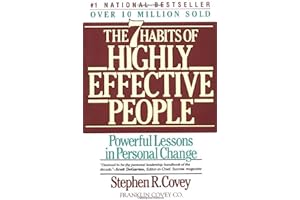One Sentence Summary:
A practical guide to achieving personal and professional effectiveness by developing powerful habits and principles.
Book Genre:
Self-help, business, personal development.
Main Topic of the Book:
The author Stephen R. Covey presents a holistic approach to personal and professional development by focusing on seven core habits that are essential for success and effectiveness in both personal and professional aspects of life.
Key Ideas:
- The difference between character ethic and personality ethic.
- The power of taking responsibility and being proactive.
- The importance of having a clear vision and setting goals.
- The significance of understanding and empathizing with others.
- The benefits of prioritizing and managing time effectively.
- The value of continuous self-improvement and self-renewal.
- The concept of interdependence and win-win relationships.
Main Parts of the Book and a Short Summary:
- Part One: Paradigms and Principles
This section focuses on understanding the principles that govern effective living and challenges readers to shift their paradigms from a dependence on external factors to a focus on internal values and principles. - Part Two: Private Victory
The second part of the book talks about the first three habits that contribute to achieving personal effectiveness:- Habit 1: Be Proactive
This habit stresses the importance of taking responsibility for one’s life and actions rather than blaming external circumstances. - Habit 2: Begin with the End in Mind
The author encourages readers to have a clear vision of what they want to achieve in life and to set specific and measurable goals that align with their values and principles. - Habit 3: Put First Things First
This habit focuses on managing time effectively by prioritizing and planning activities based on their importance rather than urgency.
- Habit 1: Be Proactive
- Part Three: Public Victory
The third part of the book revolves around the next three habits that relate to achieving successful relationships with others:- Habit 4: Think Win-Win
This habit promotes a mindset of mutual benefit and cooperation, rejecting the win-lose approach in interpersonal relationships. - Habit 5: Seek First to Understand, Then to Be Understood
The author emphasizes the importance of empathic communication, listening with the intent to understand rather than to respond, and building trust with others. - Habit 6: Synergize
This habit focuses on collaboration and teamwork, where the whole is greater than the sum of its parts.
- Habit 4: Think Win-Win
- Part Four: Renewal
The last part of the book discusses the final habit that leads to continuous personal and professional growth:- Habit 7: Sharpen the Saw
The author discusses the importance of taking care of oneself physically, mentally, emotionally, and spiritually to maintain a balance and achieve long-term effectiveness.
- Habit 7: Sharpen the Saw
Key Takeaways:
- To be highly effective, one must focus on personal character and principles rather than relying on external factors or personality traits.
- It is essential to take responsibility for one’s life and actions rather than blaming others.
- Having a clear vision and setting specific goals that align with one’s values is crucial for success.
- Developing empathy and seeking to understand others is vital for effective relationships.
- Effective time management and prioritization are essential for achieving goals and maintaining balance in life.
- Continuous self-improvement and renewal are necessary for long-term success.
- Collaboration and win-win relationships are more powerful than individual effort.
- One must take care of oneself physically, mentally, emotionally, and spiritually to maintain balance and achieve long-term effectiveness.
Author’s Background and Qualifications:
Stephen R. Covey was a renowned author, speaker, and educator who dedicated his life to teaching principles of effectiveness and personal development. He held an MBA from Harvard and a Doctorate in Religious Education from Brigham Young University. He also served as a professor and dean at the Jon M. Huntsman School of Business at Utah State University.
Target Audience:
This book is for anyone looking to achieve personal and professional effectiveness and improve their relationships and quality of life.
Publisher and First Publication Date:
“The 7 Habits of Highly Effective People” was published by Simon & Schuster in 1989.

